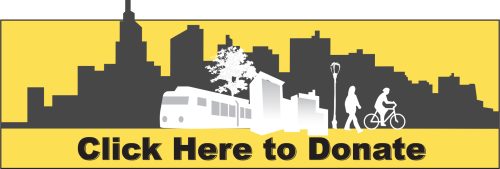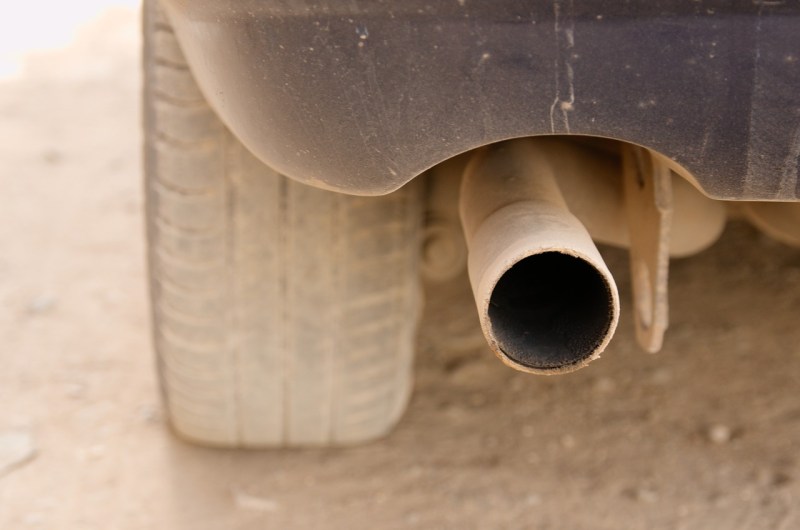
The penalty for filling New Yorkers' lungs with pollution is too low.
A Manhattan community board is demanding that the Department of Environmental Protection raise the fee on commercial trucks and bus companies for idling from the current paltry $350 to $800 — and triple the penalty to a company for a third offense from $600 to $1,800.
Community Board 4, which comprises traffic-choked Hells Kitchen, asserted that the "worst offenders" —ConEd, Verizon, Spectrum, FedEx, Amazon, Go New York Tours, Fuji bus and Greyhound — simply consider the current fines a "cost of doing business" that DEP should raise.
"At a minimum DEP should make sure these operators pay more attention to our health," the board's Chairman Lowell Kern and co-chair Christine Berthet wrote to the agency in a just-released Nov. 9 letter that followed a unanimous board vote. "Reducing idling is a simple way to do so."
The agency said only that it had received the letter, which is under review.
The letter cited seminal research by activist Jeff Novich who, earlier this year, crunched the numbers on idling from a Freedom of Information Law request he made for idling tickets, which for an unknown reason, are not part of the city's open data system and must be FOIL'ed.
Novich's data dump determined the list of "worst offenders," but he also discovered that the city's current system — which relies on citizen reporters to file complaints with the promise that they will receive 25 percent of the ticket revenue — has not taken off in the way that city officials likely hoped. Eighty-five percent of all idling submission are filed by just 20 people — and four people submitted roughly 50 percent of all idling complaints, Novich determined. (The DEP told Streetsblog that it received roughly 9,000 submissions in 2020.) Not coincidentally, the area comprising Community Board 4 had about 20 percent of the total idling complaints that year.
Novich said he appreciated the CB4 demand, but thinks the board is starting way too low.
"The fines should be 10 to 50 times their current amounts in order to properly re-align company interests with neighborhood health goals," he told Streetsblog. Extremely steep fines would send a message that these companies must properly."
The reason Novich wants to go big stems from how little idling fines hurt big companies' bottom lines. At the slightly higher rates proposed by Community Board 4, Con Edison, which is a $12-billion company, would have to pay about $500,000 more in idling fines per year, Novich discovered. Verizon, a $33-billion company, would pay about $375,000 more per year.
"I just don't see these amounts being a big enough deterrent (relative to their revenues) for large companies to retrain drivers or get electric trucks or switch to cargo bikes for deliveries," he said.
Novich also said that the city should do much more of its own enforcement of commercial idling, rather than relying on the citizen reporting program, rebranded just before the pandemic began last year under the celebrity-promoted "Billy Never Idles" campaign. (Spokesrocker Billy Idol made one public appearance to support the effort.)
"Citizen complaints, while empowering, are truly a Band Aid," said Novich. "A small but might team of volunteers go out on lunch breaks to try to enforce laws against a relentless sea of vehicles [is] great and definitely a piece of the solution. But it's a losing battle without a dedicated team of salaried enforcement agents who take their jobs seriously in relentless application of idling laws."
One of the legendary citizen reporters, George Pakenham, agreed that the city does not do enough.
"[With the promise of receiving] 25 percent of the fines imposed, citizen activists are protecting the general health of all New Yorkers, while being compensated for a job the NYPD neglects to do," said Pakenham, who created the film, "Idle Threat — Man on Emission."
Of course, DEP is not the only agency that fines vehicle owners for idling. The Department of Transportation also has a $100 idling ticket on its books. But the NYPD's traffic enforcement team writes very few tickets — all of 33 in July through September of this year, according to the agency.
The CB4 letter agreed that something's gotta give (and it should be the trucking firms) — and the board cited the recently passed state Constitutional amendment giving New Yorkers the right to "clean water, clean air, and a healthful environment."
That new provision in the state's Bill of Rights, the board wrote, "points to the need to expeditiously implement measures" such as higher ticket fees.
Spectrum did not respond to an email requesting comment. Verizon said it would not comment. And Con Ed issued the following statement:
“We pride ourselves on our environmental stewardship and strive to comply with all regulations. We have stepped up our efforts this year to ensure that we do not let vehicles idle, except for limited instances when we must in order to run essential equipment. We are determined to improve in this area and will continue to make it a priority, regardless of the level of fines.”
The effort by Community Board 4 is just the latest attempt by the forward-thinking Manhattan panel to rein in the deleterious affect of driving on our city and its people. Last year and in 2017, the board asked the city to make it easier to make intersections and bike lanes safer, in 2018, it supported key protected bike lanes on crosstown and on 10th Avenue; and earlier this year, the board definitely proved that pedestrians are systemically discriminated against in this city.






